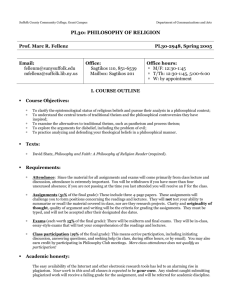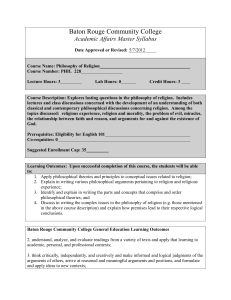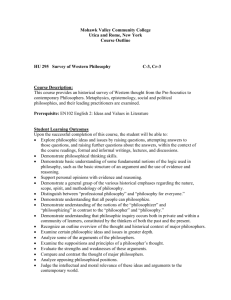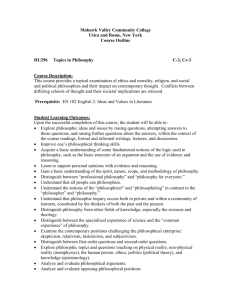CCTL Mini-Grant Proposal
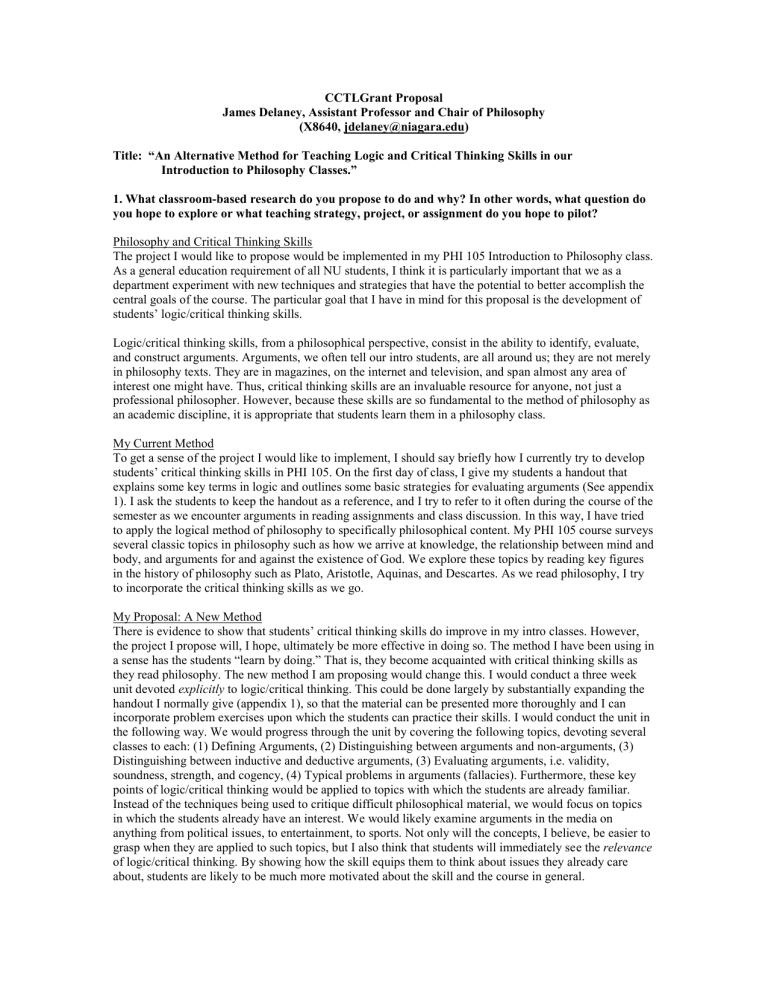
CCTLGrant Proposal
James Delaney, Assistant Professor and Chair of Philosophy
(X8640, jdelaney@niagara.edu)
Title: “An Alternative Method for Teaching Logic and Critical Thinking Skills in our
Introduction to Philosophy Classes.”
1. What classroom-based research do you propose to do and why? In other words, what question do you hope to explore or what teaching strategy, project, or assignment do you hope to pilot?
Philosophy and Critical Thinking Skills
The project I would like to propose would be implemented in my PHI 105 Introduction to Philosophy class.
As a general education requirement of all NU students, I think it is particularly important that we as a department experiment with new techniques and strategies that have the potential to better accomplish the central goals of the course. The particular goal that I have in mind for this proposal is the development of students’ logic/critical thinking skills.
Logic/critical thinking skills, from a philosophical perspective, consist in the ability to identify, evaluate, and construct arguments. Arguments, we often tell our intro students, are all around us; they are not merely in philosophy texts. They are in magazines, on the internet and television, and span almost any area of interest one might have. Thus, critical thinking skills are an invaluable resource for anyone, not just a professional philosopher. However, because these skills are so fundamental to the method of philosophy as an academic discipline, it is appropriate that students learn them in a philosophy class.
My Current Method
To get a sense of the project I would like to implement, I should say briefly how I currently try to develop students’ critical thinking skills in PHI 105. On the first day of class, I give my students a handout that explains some key terms in logic and outlines some basic strategies for evaluating arguments (See appendix
1). I ask the students to keep the handout as a reference, and I try to refer to it often during the course of the semester as we encounter arguments in reading assignments and class discussion. In this way, I have tried to apply the logical method of philosophy to specifically philosophical content. My PHI 105 course surveys several classic topics in philosophy such as how we arrive at knowledge, the relationship between mind and body, and arguments for and against the existence of God. We explore these topics by reading key figures in the history of philosophy such as Plato, Aristotle, Aquinas, and Descartes. As we read philosophy, I try to incorporate the critical thinking skills as we go.
My Proposal: A New Method
There is evidence to show that students’ critical thinking skills do improve in my intro classes. However, the project I propose will, I hope, ultimately be more effective in doing so. The method I have been using in a sense has the students “learn by doing.” That is, they become acquainted with critical thinking skills as they read philosophy. The new method I am proposing would change this. I would conduct a three week unit devoted explicitly to logic/critical thinking. This could be done largely by substantially expanding the handout I normally give (appendix 1), so that the material can be presented more thoroughly and I can incorporate problem exercises upon which the students can practice their skills. I would conduct the unit in the following way. We would progress through the unit by covering the following topics, devoting several classes to each: (1) Defining Arguments, (2) Distinguishing between arguments and non-arguments, (3)
Distinguishing between inductive and deductive arguments, (3) Evaluating arguments, i.e. validity, soundness, strength, and cogency, (4) Typical problems in arguments (fallacies). Furthermore, these key points of logic/critical thinking would be applied to topics with which the students are already familiar.
Instead of the techniques being used to critique difficult philosophical material, we would focus on topics in which the students already have an interest. We would likely examine arguments in the media on anything from political issues, to entertainment, to sports. Not only will the concepts, I believe, be easier to grasp when they are applied to such topics, but I also think that students will immediately see the relevance of logic/critical thinking. By showing how the skill equips them to think about issues they already care about, students are likely to be much more motivated about the skill and the course in general.
In addition to the exercises students complete during the three week logic unit, I would also then give a formal assignment, probably in the form of a test or quiz, at the end of the unit. These assignments would ensure that with respect to logic/critical thinking skills per se, students will take a far more active approach than I currently require. After completing the logic/critical thinking unit, I would then proceed to the standard philosophical readings I describe above.
Goals
Obviously the primary goal of this project is to determine if a formal unit on logic/critical thinking skills, as opposed to the incorporation of logic/critical thinking skills into philosophical readings, results in a higher competency of students completing PHI 105 in identifying, evaluating, and constructing arguments. For two main reasons, I am optimistic that it will. First, as I said above, the method outlined in this project requires more active engagement with the material. Critical thinking is a skill like any other, and the more one actively practices it, the more proficient one becomes. Second, and perhaps more importantly, I think my current method suffers from a rather serious defect. Almost no students enrolling in PHI 105 have had any previous experience with philosophy. Thus both the method of philosophy (logic/critical thinking), as well as the content of philosophy (problems of knowledge, the soul, God, and the writings of Plato,
Descartes, etc.), are completely new. My current method asks students to learn a method of critical thinking and apply it to material they have never before encountered. The advantage of the new method, I believe, is that it will teach the basic method first and allow students to apply it to material with which they are already familiar. Thus, after the three week formal logic unit, when we begin reading actual philosophical texts with which the students are not familiar, these skills will be far easier to apply.
2. What kind of data do you plan to collect that will help you to answer your question or document the effectiveness of the teaching strategy, project or assignment?
The data I will collect to document the effectiveness of this project will be the standard writing assignments
I require of all students in my PHI 105 classes. There are three short paper assignments (about four pages each) that students must complete. In each paper, the student must identify a particular argument in one of the readings, evaluate that argument, posit possible objections to it, and then ultimately either defend or reject the argument. The assignments measure the students’ comprehension of the material, but also their ability to use logic/critical thinking skills in evaluating that material. Therefore, these papers will serve as appropriate data for assessing how well students are learning logic/critical thinking skills.
3. How do you propose to analyze your data?
The paper assignments I discussed above will be analyzed in the following way. The philosophy department is in the process of assessing the writing of its students in PHI 206 Ethics and has therefore done substantial research on different models for measuring various elements of students’ philosophical writing, including critical thinking. I therefore have access to a number of good rubrics to use to examine the writing (appendix 2 is a possible candidate).
Applying this rubric, I will evaluate the papers noting the improvement in logic/critical thinking skills (if any) in the progression from the first assignment to the second and finally the third. I can also calculate a class average to determine the level of critical thinking skills overall.
Then I will take the data and compare it with the sample of papers that I have from my PHI 105 section from fall 2006. Because the assignments themselves will be similarly constructed and be over similar material, the only difference between this sample and the one I will collect in the upcoming section will be that the latter will have been taught logic/critical thinking skills according to the new method I am proposing in this project. Therefore, last fall’s section will be an ideal control against which to compare my data from the new method. I can then determine whether this new method better equips students with logic/critical thinking skills then the one I use currently.



